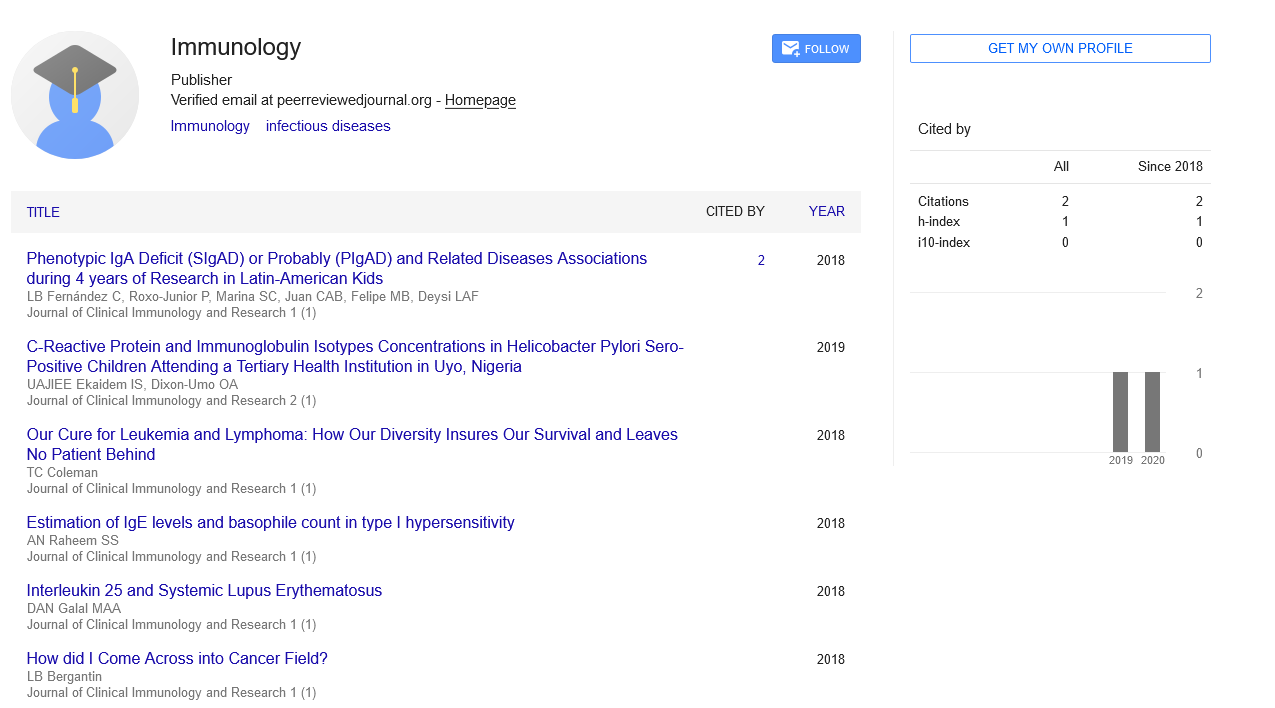Perspective, J Clin Immunol Res Vol: 6 Issue: 1
Immunotherapy Techniques for Cancer
Yuwei Yovi*
1Department of Pharmacology and Pharmacy, Li Ka Shing Faculty of Medicine, The University of Hong Kong, Hong Kong, China
*Corresponding Author: Yuwei Yovi
Department of Pharmacology and
Pharmacy, Li Ka Shing Faculty of Medicine, The University of Hong Kong, Hong
Kong, China
E-mail: yuyo@hku.hk
Received date: 19 March, 2023, Manuscript No. JCIR-23-99621;
Editor assigned date: 22 March, 2023, PreQC No. JCIR-23-99621 (PQ);
Reviewed date: 05 April, 2023, QC No. JCIR-23-99621;
Revised date: 12 April, 2023, Manuscript No. JCIR-23-99621 (R);
Published date: 19 April, 2023, DOI: 10.4172/JCIR.100070
Citation: Yovi Y (2023) Immunotherapy Techniques for Cancer. J Clin Immunol Res 6:1.
Description
Immunotherapy has emerged as a revolutionary approach in cancer treatment, harnessing the power of the immune system to recognize and destroy cancer cells. This innovative therapeutic strategy has shown promising results in various types of cancer, offering new hope for patients.
Immune checkpoint inhibitors are a class of immunotherapy drugs that work by targeting molecules that regulate immune responses. These molecules, known as checkpoints, can prevent immune cells from attacking cancer cells. Drugs such as PD-1 inhibitors (e.g., pembrolizumab) and CTLA-4 inhibitors (e.g., ipilimumab) block these checkpoints, allowing the immune system to recognize and attack cancer cells more effectively. Immune checkpoint inhibitors have demonstrated remarkable success in various cancers, including melanoma, lung cancer, and bladder cancer.
Adoptive Cell Therapy (ACT) involves modifying a patient's immune cells to enhance their cancer-fighting abilities and then reintroducing them into the patient's body. One form of ACT is Chimeric Antigen Receptor (CAR) T-cell therapy, where T cells are genetically engineered to express CARs that recognize specific cancer cell markers. CAR-T cell therapy has shown remarkable efficacy in hematological malignancies, such as certain types of leukemia and lymphoma, leading to durable remissions in some patients.
Cancer vaccines aim to stimulate the immune system to recognize and attack cancer cells. There are two main types of cancer vaccines: preventive (prophylactic) vaccines and therapeutic vaccines. Preventive vaccines, such as the Human Papillomavirus (HPV) vaccine, can prevent certain viral infections that can lead to cancer. Therapeutic vaccines, on the other hand, are designed to boost the immune response against existing cancer cells. These vaccines can target specific tumor antigens or stimulate the immune system more broadly. Although therapeutic cancer vaccines are still under development, they hold significant promise for treating various types of cancer.
Cytokines are small proteins that play crucial roles in regulating immune responses. Cytokine-based therapies involve using these proteins to enhance the immune response against cancer. Interferons and interleukins are two types of cytokines commonly used in cancer immunotherapy. For example, interferon therapy can help boost the immune response and slow the growth of certain types of cancer cells. Interleukin-2 (IL-2) therapy has shown effectiveness in treating metastatic melanoma and kidney cancer by stimulating the activity of immune cells.
Combining different immunotherapy techniques or combining immunotherapy with other treatment modalities, such as chemotherapy or targeted therapy, has shown promising results in improving treatment outcomes. Additionally, ongoing research and clinical trials are exploring new immunotherapy techniques and combinations, including the use of immune agonists, immune modulators, and personalized immunotherapies, to further enhance the effectiveness of cancer immunotherapy.
Conclusion
Immunotherapy techniques have revolutionized cancer treatment by leveraging the power of the immune system to fight cancer. Immune checkpoint inhibitors, adoptive cell therapy, cancer vaccines, and cytokine-based therapies are among the exciting approaches being utilized. These techniques offer new avenues for patients with various types of cancer, with many demonstrating significant clinical benefits and durable responses. The continued advancement of immunotherapy, along with combination therapies and emerging approaches, holds great promise for the future of cancer treatment, bringing us closer to more effective and personalized immunotherapeutic strategies.
 Spanish
Spanish  Chinese
Chinese  Russian
Russian  German
German  French
French  Japanese
Japanese  Portuguese
Portuguese  Hindi
Hindi 